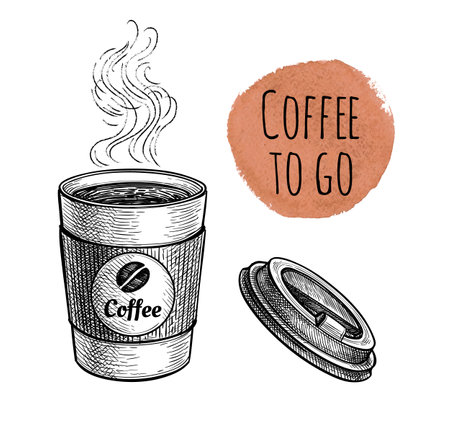1. Introduction: The Rise of Organic Coffee
Step into any trendy café from Brooklyn to San Francisco, or stroll down the aisles of your local Whole Foods, and you’ll notice a buzzword brewing everywhere: organic coffee. With chalkboard menus boasting “100% organic” espresso shots and grocery shelves lined with eco-friendly packaging, organic coffee has become more than just a morning ritual—it’s a lifestyle statement. But what’s behind this groundswell of interest? Is it just the latest trend in America’s ever-evolving coffee culture, or does it hint at a deeper shift in how we source and savor our daily cup? As the specialty market continues to shape how Americans experience coffee, understanding where organic fits in is more important than ever. In this article, we’ll dig into how organic coffee earned its spotlight in the U.S., setting the stage for a closer look at whether its place in the specialty scene is fleeting hype or part of a long-term movement.
2. Defining Organic in the Context of Coffee
When American consumers hear the term “organic coffee,” it often conjures images of lush, chemical-free plantations and eco-conscious farmers tending to shade-grown beans. But what does “organic” truly mean in the U.S. specialty coffee market? To understand this, its crucial to break down the federal regulations, certifications, and cultural perceptions that shape how Americans experience organic coffee.
U.S. Organic Coffee Regulations
In the United States, organic certification is overseen by the USDA (United States Department of Agriculture). For coffee to be labeled as “organic,” both the beans and their production processes must meet stringent criteria:
| Requirement | Description |
|---|---|
| No Synthetic Pesticides or Fertilizers | Coffee must be grown without prohibited substances for at least three years. |
| Non-GMO | The use of genetically modified organisms is strictly forbidden. |
| Sustainable Farming Practices | Soil fertility and biodiversity must be maintained or improved through crop rotation, composting, and other natural methods. |
| Traceability & Certification | The entire supply chain—from farm to roaster—must be certified by a USDA-accredited agency. |
Key Certifications in the Specialty Market
While USDA Organic is the gold standard, many specialty roasters pursue additional certifications to appeal to ethically minded consumers. Some popular options include:
- Fair Trade Certified: Focuses on equitable prices and labor practices for farmers.
- Rainforest Alliance Certified: Emphasizes environmental conservation alongside social responsibility.
- Smithsonian Bird Friendly: Encourages shade-grown coffee that protects wildlife habitats.
The American Consumer Mindset
For many Americans, buying organic coffee isnt just about health—its a lifestyle statement. According to recent consumer research, shoppers are motivated by a mix of environmental concern, perceived health benefits, and a desire for transparency in sourcing. The specialty market amplifies these values: customers expect not only great flavor but also responsible stewardship from farm to cup. In cities like Portland, Austin, and San Francisco, ordering an organic pour-over signals both connoisseurship and commitment to sustainable living—a fusion of taste and ethics that resonates deeply with today’s urban coffee culture.

3. Specialty Coffee Culture and the Organic Wave
From the indie roasters of Portland to the hip coffee trucks of Austin, America’s specialty coffee scene is buzzing with a new energy—the organic movement. These cities, celebrated for their cutting-edge café cultures and ever-curious crowds, are now becoming showcases for what happens when sustainability meets caffeine obsession. Baristas and roasters are no longer just discussing single-origin beans or innovative brew methods; they’re also highlighting the organic credentials of their coffee, making ethical sourcing as much a part of the experience as latte art.
In neighborhoods like Southeast Portland or East Austin, it’s not unusual to see menus proudly listing “USDA Certified Organic” next to tasting notes of berries or dark chocolate. The demand isn’t just coming from eco-conscious millennials—parents, professionals, and even tourists are asking about pesticide-free beans and regenerative farming practices. Local shops are responding by forging direct relationships with organic farmers, hosting educational cuppings, and sharing stories that go beyond origin to include sustainability milestones.
This integration of organics is subtly shifting American coffee culture. It’s no longer enough to serve a great cup; customers want transparency and authenticity in every sip. For local cafés, offering organic options is a way to stand out in crowded markets while aligning with values that matter to their communities. In cities where food trends often start before spreading nationwide, the rise of organic offerings in specialty shops suggests that this wave could be more than just a fleeting trend—it might be setting the tone for how Americans experience coffee for years to come.
4. Consumer Mindset: Trend-Driven or Values-Driven?
In the bustling world of American specialty coffee, understanding what truly motivates consumers to choose organic is like mapping a city through its secret alleyways—each route reveals a different story. Are coffee drinkers reaching for that organic label out of genuine belief, or are they just catching the next cultural wave?
Motivations Behind Choosing Organic Coffee
For many U.S. consumers, the decision to buy organic coffee goes beyond taste or aroma. It’s about aligning their morning ritual with deeply held values—or at least, with what’s trending on their social feeds. Health consciousness plays a starring role; shoppers are increasingly wary of pesticides and chemicals, seeking peace of mind in every cup. Sustainability is another powerful driver, as eco-friendly choices become part of one’s personal brand and identity.
How Americans Weigh Their Options
| Motivation | Description | Prevalence Among Buyers |
|---|---|---|
| Health | Avoiding chemicals, seeking cleaner options | High |
| Sustainability | Supporting eco-friendly farming and ethical sourcing | Medium-High |
| Status/Trendiness | Following lifestyle trends, social signaling | Medium |
| Taste & Quality | Belief that organic means better flavor or quality | Medium-Low |
The Fine Line Between Values and Trends
Coffee culture in America is as much about storytelling as it is about brewing methods. Some consumers see buying organic as an authentic extension of their environmental or health values—a long-term commitment woven into daily life. Others may be drawn by the status that comes with sipping something ‘clean’ and ethically sourced, especially when these choices are amplified on Instagram or discussed at third-wave coffee shops.
What does this mean for the specialty market? While there is certainly a trend-driven crowd eager to try whatever’s hot right now, data shows a substantial segment choosing organic for deeper, more lasting reasons. As cities evolve and values shift, so too do the motivations behind each pour-over or espresso shot ordered across the U.S.—creating a landscape where both fleeting trends and enduring movements shape the future of organic coffee.
5. Marketplace Response: From Roasters to Baristas
Across the American specialty coffee landscape, the rise of organic offerings has triggered a fascinating shift in both business strategy and cafe culture. For many independent roasters, embracing organic beans isn’t just a checkbox for compliance—it’s a chance to stand out in a crowded field. These businesses often highlight organic certifications front and center, weaving them into their storytelling on packaging, websites, and even chalkboard menus. In some cases, being able to say “we source certified-organic” becomes as much a brand signature as house-roasted beans or creative lattes.
Yet, the motivation goes beyond marketing gloss. Especially in forward-thinking cities like Portland, Austin, or San Francisco, adopting organic is increasingly seen as an extension of core company values—think environmental stewardship, supporting ethical farming practices, or building transparency into every cup. Cafes might host producer talks or origin-focused events to connect customers with the journey behind their morning pour-over. For these businesses, organic isn’t a fleeting trend—it’s part of a deeper commitment to quality and sustainability that resonates with their community-minded clientele.
Still, not every shop is driven by philosophy alone. In competitive urban markets or rapidly gentrifying neighborhoods, customer demand can be the biggest driver. As more Americans ask about sourcing and sustainability at the register, even long-standing local spots are feeling the pressure to offer at least one organic option—if only to keep pace with changing tastes. Some chains have responded with limited-time organic blends or highlighted “clean label” drinks to capture health-conscious consumers without overhauling their entire supply chain.
The result? A patchwork of approaches where organic coffee is sometimes a badge of honor, sometimes a savvy business move, and sometimes just another box ticked on a menu board. Whether it’s your favorite neighborhood barista chatting about soil health or a new drive-thru boasting “organic espresso shots,” it’s clear that American coffee professionals are navigating the organic wave in ways that reflect both their values—and the realities of the marketplace.
6. Long-Term Prospects for Organic Coffee
Is organic coffee just a fleeting trend, or is it carving out a permanent space in America’s specialty coffee landscape? To answer this, let’s dive into what experts and recent industry data are telling us about the future of organic brews on U.S. soil.
Expert Perspectives: Beyond the Hype
Leading voices in the specialty coffee sector generally agree that while consumer enthusiasm can ebb and flow, interest in organic coffee has shown remarkable staying power. According to Dr. Emma Carter, a sustainability analyst at the Specialty Coffee Association, “The demand for organic isn’t just about health—it’s about transparency, environmental stewardship, and supporting ethical supply chains.” This multidimensional appeal gives organic coffee a resilience that trends based solely on flavor profiles or packaging rarely enjoy.
Industry Data: The Numbers Behind the Movement
Recent market research supports these expert opinions. The National Coffee Association’s 2023 report found that more than 60% of American specialty coffee drinkers consider certifications like USDA Organic important when choosing their daily brew. Additionally, retail sales of organic coffee have grown steadily year-over-year, even as overall coffee consumption has plateaued. This suggests that organic is not only weathering economic fluctuations but thriving despite them.
Cultural Shifts and Consumer Loyalty
The American coffee scene has always been dynamic—think third wave cafés, cold brew crazes, and oat milk explosions—but the steady climb of organic coffee points to deeper cultural shifts. Consumers are increasingly tying their purchasing decisions to values like sustainability, wellness, and social responsibility. As long as these priorities continue to shape public consciousness, the foothold of organic coffee seems secure.
In sum, both industry insiders and hard data signal that organic coffee is well on its way from being just another trend to becoming a mainstay in America’s specialty coffee story. Its continued relevance will depend on ongoing transparency, quality assurance, and education—but all signs point toward enduring growth rather than a short-lived spike.
7. Conclusion: Brewing a Sustainable Future?
So, is organic coffee in the specialty market just another fleeting trend, or are we witnessing the roots of a long-term movement? In many American cities, the answer feels increasingly clear: organic coffee has become more than a buzzword—it’s shaping our urban café culture and redefining what it means to be a conscious consumer. Specialty cafés from Brooklyn to Portland aren’t just serving up better beans; they’re creating spaces where sustainability, transparency, and taste all blend together. This isn’t only about what’s in your cup, but also about how that cup impacts farmers, communities, and the planet. The growing demand for organic options reflects a deeper shift toward mindful living and ethical choices. As city dwellers continue to seek out meaningful experiences—whether it’s sharing a pour-over with friends or supporting local roasters who champion environmental responsibility—organic coffee is poised to remain a staple rather than fade away. Looking ahead, the evolution of organic coffee in specialty cafés could set new standards for quality and sustainability across the entire industry. For urban coffee lovers, this means more opportunities to enjoy their daily ritual while supporting a future that values both flavor and stewardship. The movement isn’t just brewing; it’s here to stay.


